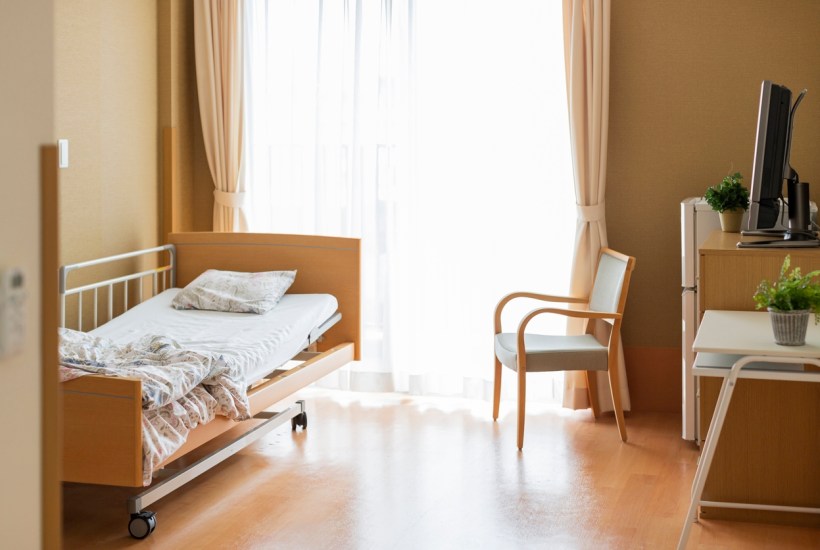The loneliest pandemic deaths are in ‘care’ homes. Old people with dementia and people of all ages with severe mental disabilities do not understand why their families have stopped visiting them. The people they loved, often the only people they would allow to brush their teeth, dress and feed them, have vanished for no reason they can understand.
They stop eating, they self-harm, they withdraw into themselves, and they die in extraordinary numbers. Their final moments must include the thought that those they loved most have abandoned them.
Their families, meanwhile, suffer the sadness of never being able to say goodbye. The comments attached to a crowdfunderfor a legal action – to order Matt Hancock to find a smidgeon of compassion in what passes for his soul and let people visit their loved ones in care homes – read like a modern Book of Lamentations.
‘My dad has Alzheimer’s and is profoundly deaf. We communicate by my writing on a whiteboard whilst standing outside a downstairs window at the Home. However, I was told this week window visits will now not be allowed.’
‘This is imprisonment. Imprisoned by dementia. Now imprisoned by the government. Thank you for challenging this injustice.’
‘I ache to see my sister – she is declining into a state of oblivion – hard to accept at any point – without the comfort only I can provide it is beyond cruel’
‘I have seen my mother only once face to face since 12 March despite her living only two miles from my home. We miss each other hugely and I can’t bear to think we face another six months like this.’
On and on it goes. Mothers who cannot see their children. Children whose mothers devoted themselves to their care who cannot now help when help is most needed. The women behind the legal action, Julia Jones and Nicci Gerrard, have had some success. Their solicitors Leigh Day used the Human Rights and Equalities acts to force Hancock to accept care home visits. Homes must treat residents as individuals and complete risk assessments before stopping relatives visiting. But there is a catch.
Government guidanceissued this month says that homes in areas on high Covid alert can still issue blanket bans on visits, except in exceptional circumstance when a relative is dying. Children, who provide essential emotional and practical support to parents with dementia, are as unwelcome now as they have been since March.
As much of England will soon be covered by high-risk alerts, tens of thousands are likely to suffer. Jones and Gerard talk of the ‘extremely destructive effect of suspending visits’ on people with dementia, ‘who we know are dying at higher rates than during any other year directly as a result of the isolation they are experiencing’.
Still the government persists with lockdowns in high-risk areas. Even in medium-risk areas, the guidance says only that care homes ‘can’ draw up policies for limited visits, not that they ‘must’. Many care homes have been closed to families since March. And most will stay that way.
The tough pose to strike is to say that callous measures are necessary to stop the virus spreading. But tough poses are not as hard-headed as they seem, and not only because most elderly residents of care homes are close to death, virus or no virus. There is no evidence that carefully managed visits with relatives in protective gear who follow the usual routines of distancing and hand washing have spread the virus in care homes. The main sources of infection are doctors and nurses coming in from outside, patients sent in by the NHS without proper checks, and the high turnover of care home staff. Before the pandemic started, Britain treated caring for the vulnerable as menial work. Low pay, poor job security and the absence of career paths meant that there was a huge reliance on temporary workers. Now with the staff isolating or burning out, the churn is higher.
Banning controlled visits from relatives will make the burnout higher, as staff have to cope with the consequences of lockdown, which ought to be well-enough known by now. Covid has allowed doctors to undertake a grim medical experiment on the effects of isolation. Paperson dementia sufferers in lockdown show high states of agitation, apathy and depression, deteriorating health and increased reliance on antipsychotics or related drugs.
New technology does not help. In evidenceto the Health and Social Care and Committee last week, Theresa Steed, the manager of the Tunbridge Wells Care Centre, said ‘for somebody with dementia, looking at a WhatsApp tablet is like looking at a picture that is moving. It is not like seeing their loved ones, and it is not like getting a hug or giving them a kiss.’
I should declare an interest and say I have known and admired Julia Jones and Nicci Gerrard for years. Their charity, John’s campaign, named after Gerrard’s father, Dr John Gerrard, who was diagnosed with Alzheimer’s in his mid-seventies, has persuaded about 1,000 institutions to agree to treat the families of the sick as partners. Their appeal to cover the legal costs of taking Hancock to court is already over £50,000 but they need another £20,000. If you have a few quid spare and a relative in care, it is worth helpingthem out. As I said, reading the comments of people struggling with this misery on their fund-raising page should be enough to set the minds of doubters at risk.
When all the arguments about the practical consequences of isolation have been made, the conviction of their lawyers remains that the government is behaving unlawfully. It is not treating the old and people with severe mental
disabilities as individuals. It is not assessing risks or asking what is in their best interests.
All kinds of theories are floating around as relatives try to explain Hancock’s cruelty. Many say that homes are worried that they will be open to legal action if they lift bans on visits. If so, then the government could indemnify them against insurance risk as they have indemnified other sectors.
To my mind the simplest explanation is the best. Imposing blanket bans is the easy option. Ban, forget, move on. Jones, Gerrard and all those who are supporting them are determined to make the easy option a hard course, and one that Hancock will regret taking.
Got something to add? Join the discussion and comment below.
Get 10 issues for just $10
Subscribe to The Spectator Australia today for the next 10 magazine issues, plus full online access, for just $10.





















Comments
Don't miss out
Join the conversation with other Spectator Australia readers. Subscribe to leave a comment.
SUBSCRIBEAlready a subscriber? Log in